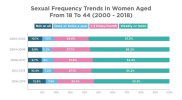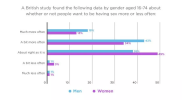Are men more sexually active than women? Men generally have a higher sex drive, but that doesn’t necessarily mean they’re having more sex.
More males report that they want to have sex more often than females, but recent data suggests women might be having sex more often.
Here’s a look at the numbers.





Here are the medical symptoms associated with high and low libido.
More males report that they want to have sex more often than females, but recent data suggests women might be having sex more often.
Here’s a look at the numbers.
- When asked if they wished they had more or less sex with their partner, participants in one survey responded in the following ways:
- Male
- “I wish my partner and I had sex more often” – 34%
- “I am happy with the amount of sex my partner and I have” – 37%
- “I wish my partner and I had sex less often” – 7%
- “Don’t know” – 8%
- “Prefer not to say” – 14%
- Female
- “I wish my partner and I had sex more often” – 23%
- “I am happy with the amount of sex my partner and I have” – 40%
- “I wish my partner and I had sex less often” – 4%
- “Don’t know” – 9%
- “Prefer not to say” – 23%
- Male





What’s Considered A High Or Low Sex Drive?
Fluctuating sex drive is normal, and there are many reasons it can change. The primary indicator of a low or high sex drive is that it impacts your life in ways you don’t feel like you have control over.Here are the medical symptoms associated with high and low libido.
- High libido is characterized in the following ways: (Very Well Health, 2020)1
- Your sexual activity begins to impact your life, relationships, health, and work.
- Sexual desire takes over your thoughts and behavior.
- You use sex to cope with mental challenges such as depression or anxiety.
- Your relationships are at risk due to your high sexual appetite.
- You feel empty or unfulfilled after having sex.
- Low libido is characterized in the following ways: (Very Well Health, 2020)1
- Loss of desire for a partner.
- Disinterest in masturbation.
- Few or no sexual fantasies.
- Stress or concern about a lack of interest in sex.





